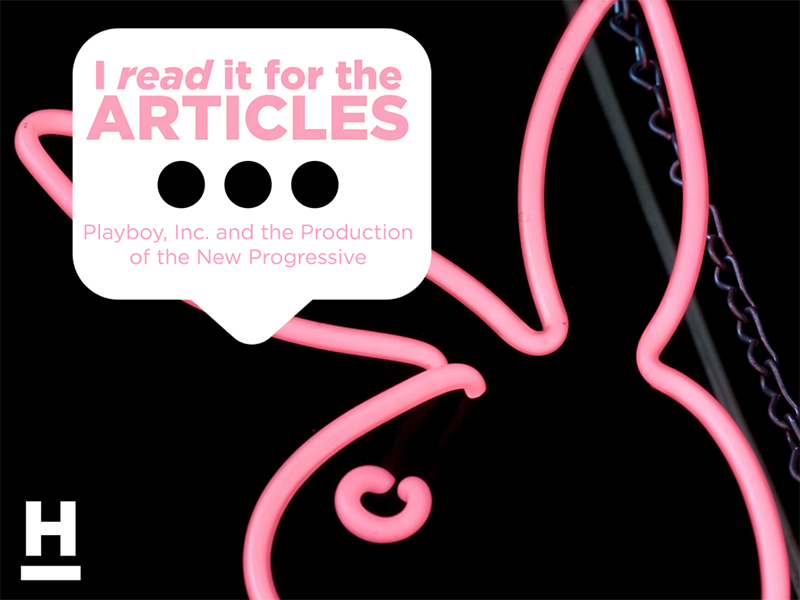Lisa Corrigan, Honors College professor of communication and director of the Gender Studies Program, will turn to the pages of Playboy magazine and look past the déshabillé and into the progressive subjectivities that spurred a shift in culture in the next Honors College Mic lecture, “I Read It for the Articles: Playboy, Inc. and the Production of the New Progressive.”
The lecture is scheduled for at Thursday, Nov. 2, in Gearhart Hall Auditorium (GEAR 26) at 5:15 p.m.
“I think attendees of the lecture will be surprised at how thoughtful and intentional Playboy was as a political discourse deeply invested in healing the trauma of the World War II, for both men and women, queer people and straight people,” Corrigan said. “The magazine was fundamentally a literary project aimed at building a new public square for deep engagement, debate and confrontation with the day’s most pressing issues. The early goal was to stretch citizenship into a more inclusive postwar framework and challenge American readers to think deeply about their prior beliefs.”
The Honors College Mic showcases notable leaders, alumni and scholars who share insights and expertise on a wide range of topics. Overall, these lectures foster intellectual conversation at the U of A through dialogue between lecturer and student, faculty and staff, and the wider populace.
“The Honors College Mic series chose Playboy precisely because professor Corrigan’s work on the subject disrupts stereotypical thinking about the invention and implementation of a 'gentleman’s culture' in the post-World War II era,” noted Lynda Coon, dean of the Honors College. “Playboy played a pivotal role in shaping social movements which continue to transform American society to the present day.”
The lecture will focus on the co-evolution of Playboy magazine and the larger corporate culture in Playboy, Inc. to understand how founder Hugh Hefner used the magazine and the Playboy Foundation to create a new progressive vision in the postwar period.
“Particularly through the early 1970s, Playboy was extremely focused on rebuilding a culture absolutely devastated by the effects of World War II, mostly through literature, criticism and public debate,” Corrigan noted. “The centerfolds were used to ease the postwar transition to what became midcentury liberalism.”
Although her research began with writer Alex Haley who was hired to “produce the ‘Playboy Interviews,’ particularly focused on civil rights luminaries like Martin Luther King, Jr. and Malcom X,” Corrigan was surprised by Hefner’s impact on civil rights.
“I had no idea Hugh Hefner was so instrumental in desegregating nightclubs across the U.S.,” Corrigan shared. “His creation of the Playboy clubs effectively ended segregation in nightclubs because he prohibited racial discrimination in staff and talent.”
Using extensive archival research, Corrigan charts Playboy's deep investment in gay liberation, civil rights, Black Power activism and feminism to understand how the organization both argued for and financed a bold new vision of American citizenship.
“The amount of LGBTQ+ content in Playboy is incredible and completely unstudied,” Corrigan said. “It was a rich and inclusive resource for all kinds of people interested in more equitable romantic and sexual relationships.”
ABOUT LISA CORRIGAN
Lisa Corrigan is a professor of communication and director of the Gender Studies Program at the U of A. She's the award-winning author of Prison Power: How Prison Politics Influenced the Movement for Black Liberation (University Press of Mississippi, 2016) and Black Feelings: Race and Affect in the Long Sixties (University Press of Mississippi, 2020).
She's the editor of #MeToo: A Rhetorical Zeitgeist (Routledge, 2022) and is a current contributor to The Nation magazine. She also co-hosts the popular podcast Lean Back: Critical Feminist Conversations with Laura Weiderhaft.
Corrigan is currently finishing a book titled Intimacy Regimes: Race, Sex, and Surveillance, where she will trace how FBI surveillance of the civil rights movements, using wiretaps, informants and snitches, produced destructive and extractive interracial intimacies.
About the Honors College: The University of Arkansas Honors College was established in 2002 and brings together high-achieving undergraduate students and the university’s top professors to share transformative learning experiences. Each year the Honors College awards up to 90 freshman fellowships that provide $80,000 over four years, and more than $1 million in undergraduate research and study abroad grants. The Honors College is nationally recognized for the high caliber of students it admits and graduates. Honors students enjoy small, in-depth classes, and programs are offered in all disciplines, tailored to students’ academic interests, with interdisciplinary collaborations encouraged. All Honors College graduates have engaged in mentored research.
About the University of Arkansas: As Arkansas' flagship institution, the U of A provides an internationally competitive education in more than 200 academic programs. Founded in 1871, the U of A contributes more than $2.2 billion to Arkansas’ economy through the teaching of new knowledge and skills, entrepreneurship and job development, discovery through research and creative activity while also providing training for professional disciplines. The Carnegie Foundation classifies the U of A among the few U.S. colleges and universities with the highest level of research activity. U.S. News & World Report ranks the U of A among the top public universities in the nation. See how the U of A works to build a better world at Arkansas Research and Economic Development News.
Topics
Contacts
Shelby Gill, director of communications
Honors College
479-575-2024,
